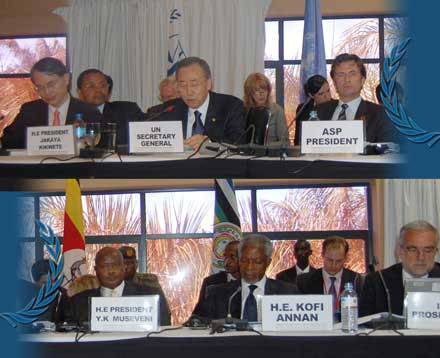
By Mubatsi Asinja Habati
What did the first-ever Review Conference of the Rome Statute, which founded the International Criminal Court (ICC), in Kampala achieve?
Between May 31 and June 11 2010, delegates from 111 state parties to the 1998 Rome Statute, non-state parties like the United States of America, NGOs, and others discuss proposed amendments to the Rome Statute and assessed its impact to date.
The conference deliberated on the rights of people during war times. It sought to arrive at amendments that increase the vigilance of the ICC on crimes against humanity, protect and ensure justice for victims of war, and make the court more active on prosecuting crime of state aggression.
The ICC is currently handling war crimes and crimes against humanity from various countries, including five from Africa. In Africa alone, the ICC is investigating five key cases but has so far convicted none.
The cases being investigated by the ICC are atrocities allegedly committed by the commanders of the Lords Resistance Army in Uganda and during the post-election violence in Kenya. Other cases include the alleged war crimes committed by Congo’s ex-Vice President Jean Pierre Bemba, alleged war crimes by Sudan President Omar El-Bashir and the case of Thomas Lubanga, the former leader of a militia group accused of war crimes in the civil conflict in DR Congo. T he ICC is also handling the case of former Bosnian Serb leader Radovan Karadzic.

The UN Secretary General, Ban Ki-moon, at the opening of the conference called on African nations to co-operate with the ICC by arresting fugitive warlords against whom the court issued arrest warrants. He said the old era of impunity is over and a new age of accountability was setting in slowly but surely.
In this new age of accountability, those who commit the worst of human crimes will be held responsible, said Ban.
President Yoweri Museveni of Uganda challenged the conference to define just and unjust wars, freedom fighters and terrorists. He argued that one might fight a just war but use terrorist tactics to achieve freedom of people.
According to a statement by the Coalition for the ICC (CICC), an NGO, two important decisions on the proposed amendments to the Courts treaty were reached.
First, after high-level discussions, the conference agreed not to delete Article 124 of the Rome Statute that allows States not to subject their nationals to the Court’s prosecutions or investigations over war crimes for a seven year period.
Secondly, States accepted to extend the use of poisonous or nuclear chemicals as war crimes in non-international conflicts.
The CICC, however, does not list the handling of a third major issue at the conference, the crime of aggression, as a success.
“The Coalition for the ICC is advocating for an end to impunity for all serious crimes, including the Crime of Aggression,” said CICC Convenor William R. Pace. “Although agreement on the definition of the crime is a step forward for international justice, and more importantly for victims of this crime, the conditions agreed by States for the prosecution of the crime would leave many states out of the reach of justice,” he emphasised.
Pace’s comment reflect the extent of controversy over the crime of aggression that stretched on past the last day of the conference with participating countries discussing the matter into the day after the conference had officially ended.
The small power states wanted to sign the crime of aggression as soon as possible but the five superpowers were opposed to the definition of the law. The United Nations Security Council permanent members states were worried the crime of aggression would make the court more powerful and would have powers to investigate the so-called superpowers.
In the end, the conference defined the crime of aggression as the use of force that manifestly breaches the United Nations charter and includes an invasion, a bombardment, port blockade or a country allowing a state to use its territory to attack a third nation.
But the conference failed to give the ICC jurisdiction over the crime of aggression until 30 states have ratified the new amendment. In addition, States Parties will have to make a positive decision to activate the jurisdiction after Jan.1, 2017.
Interestingly the non-signatories to the Rome Statute such as the Unites States of America who were invited to the meeting as observers ended up lecturing the participating countries on the pros and cons of the crime of aggression.
While other nations purely saw the crime of aggression as a political matter others viewed it as a way of getting at and restraining the big powers from bullying other nations especially those regarded as weak.
Some participants feared that handling crimes of aggression would make the court political and weaken its effectiveness.
It was feared by some of the Security Council member states like the US that giving this power to ICC would contravene the UN charter.
“The language of the definition specifically says what can be prosecuted is an act of such character and gravity and scale that it would constitute a manifest violation of the UN charter,”Stephen J. Rapp, US ambassador-at-large for war crimes issues, told journalists.
The ICC’s mandate is to protect future generations from genocide and other crimes against humanity that have ravaged generations past and present. In failing to expand the Court’s mandate to prosecute the crime of aggression, the Kampala conference may have failed to strengthen the ICC’s effective and the broader system of international justice.
READ THE ICC REPORT FROM THE KAMPALA CONFERENCE (click here)
 The Independent Uganda: You get the Truth we Pay the Price
The Independent Uganda: You get the Truth we Pay the Price


